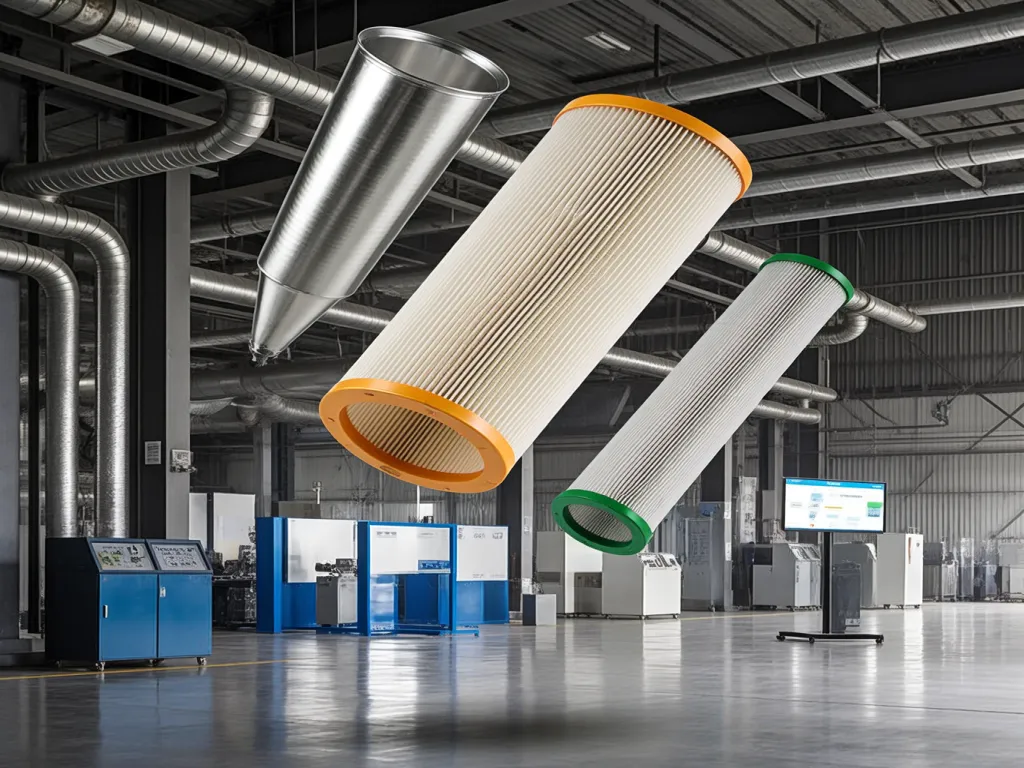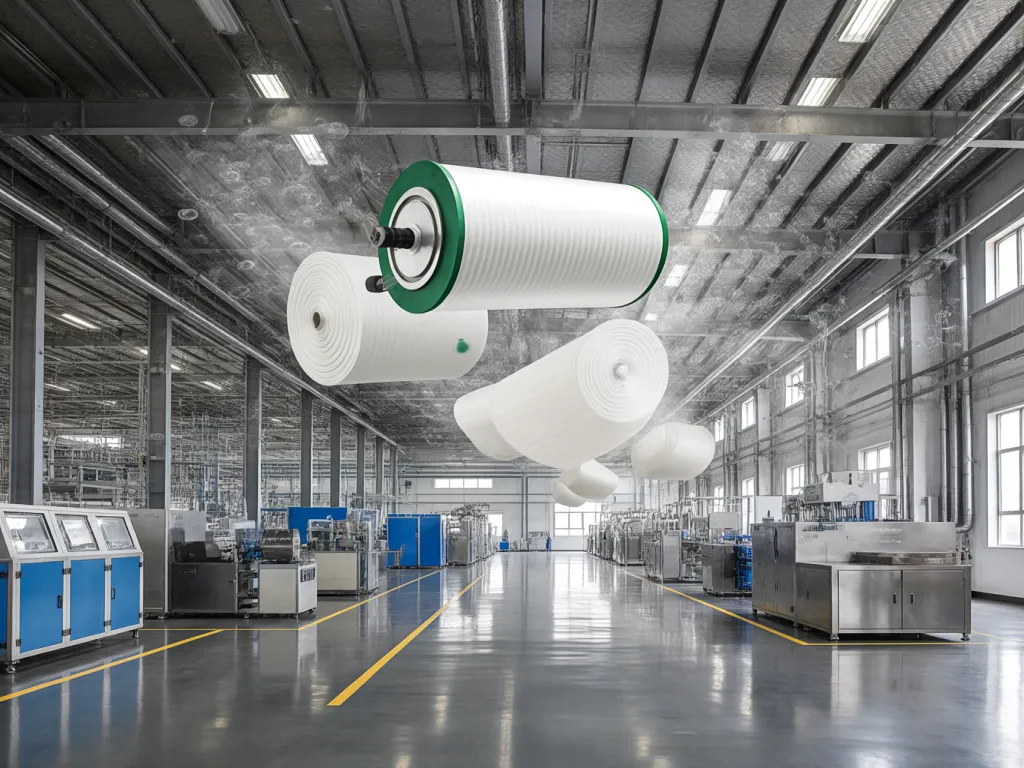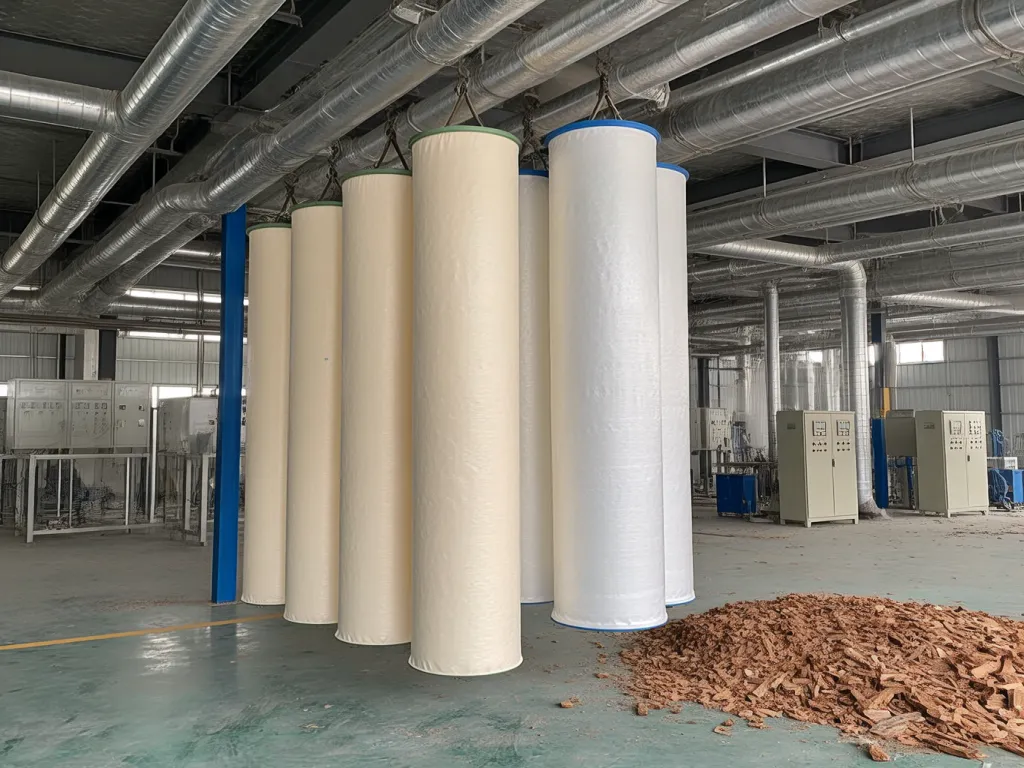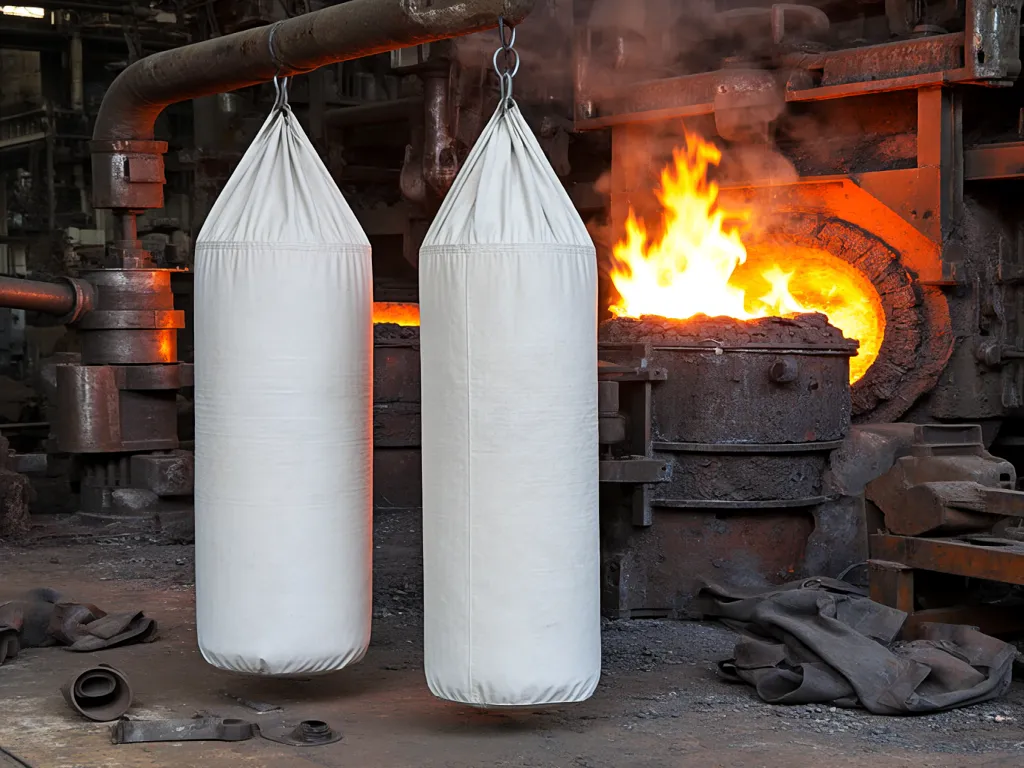Material Matters: Filter Bags for Industrial Dust Collectors

When it comes to industrial dust collection, the right filter bags can make all the difference. But have you ever stopped to consider how the material of those filter bags for industrial dust collectors affects their performance? From polyester to polypropylene and Nomex, each material brings its own set of strengths to the table. In this guide, we’ll dive deep into the world of filter bag materials, helping you understand which one suits your industrial needs best. Ready to find the perfect match for your dust collector?

Polyester Fiber Material: Exploring Its Chemical Resistance, Air Permeability, and Cost-Effectiveness, with Analysis of Optimal Industrial Environments
When it comes to selecting the right filter bags for industrial dust collectors, polyester fiber stands out as a versatile and reliable choice. But why exactly should you consider polyester for your dust collection needs? Let’s dive into its key properties and explore the industrial settings where it truly shines.
First and foremost, polyester filter bags excel in chemical resistance.
This material can withstand a wide range of chemicals without degrading, making it ideal for environments where corrosive substances are present. Whether you’re dealing with acidic fumes in a metal plating facility or alkaline dust in a chemical processing plant, polyester bags maintain their integrity, ensuring consistent performance over time. Imagine the peace of mind knowing your filter bags won’t fail prematurely due to chemical exposure!
But chemical resistance is just one piece of the puzzle.
Polyester also boasts impressive air permeability, which is crucial for efficient dust collection. The structure of polyester fibers allows for optimal airflow while still effectively capturing dust particles. This means your dust collector can operate at peak efficiency, reducing energy consumption and lowering operating costs. Have you ever considered how much money you could save by optimizing your dust collection system’s airflow?
Now, let’s talk about cost-effectiveness.
Polyester filter bags offer an excellent balance between performance and price. Compared to some high-end materials, polyester provides comparable durability and filtration efficiency at a fraction of the cost. This makes it an attractive option for businesses looking to maximize their return on investment without compromising on quality. For many industrial operations, especially those with moderate dust loads and non-extreme temperatures, polyester represents the sweet spot of affordability and reliability. Explore our range of wholesale polyester dust collector filter bags to find the perfect fit for your needs.
So, where does polyester truly excel?
It’s particularly well-suited for general industrial applications, including woodworking shops, metal fabrication facilities, and food processing plants. These environments typically don’t expose filter bags to extreme temperatures or highly corrosive chemicals, allowing polyester to perform admirably. Additionally, industries with fluctuating dust loads benefit from polyester’s versatility and consistent performance across varying conditions. For specific applications like 7-inch polyester filter socks, the adaptability of polyester makes it a top choice.
But what about industries with more demanding requirements?
Polyester can still play a role, often in combination with other materials or as part of a multi-stage filtration system. For example, in pharmaceutical manufacturing where both chemical resistance and high filtration efficiency are critical, polyester bags might be used in preliminary filtration stages. For more specialized applications, consider polyester pocket filter bags for enhanced filtration.
In conclusion
polyester fiber filter bags offer a compelling combination of chemical resistance, excellent air permeability, and cost-effectiveness. By understanding your specific industrial environment and dust collection needs, you can determine whether polyester is the optimal choice for your operation. And remember, choosing the right filter bag material is about more than just initial cost—it’s about long-term performance, reliability, and total cost of ownership.

Polypropylene Material: Analyzing Temperature Resistance, Hydrolysis Resistance, and Suitability in Specific Dust Environments
When it comes to choosing the right filter bags for industrial dust collectors, material selection can make or break your system’s efficiency. Among the various options available, polypropylene (PP) stands out for its unique combination of properties, especially in environments where moisture, temperature fluctuations, and specific dust types are prevalent. Let’s dive into why polypropylene might be the perfect fit for your industrial dust collection needs.
Firstly, let’s talk about temperature resistance. Polypropylene filter bags are designed to withstand a wide range of operating temperatures. Typically, they can handle continuous temperatures up to around 190°F (88°C) without significant degradation. This makes them suitable for many industrial processes where moderate heat is generated, such as in food processing, pharmaceuticals, or certain chemical manufacturing applications. However, it’s crucial to note that while PP can tolerate these temperatures, prolonged exposure to higher heats can lead to reduced lifespan and performance. So, if your operation consistently runs hotter, you might want to consider alternative materials like Nomex. For those seeking cost-effective solutions, exploring options like polyester dust collector filter bags could also be beneficial, depending on your specific needs.
Now, onto hydrolysis resistance—a critical factor in environments with high humidity or where water-based processes are involved. Polypropylene excels here because it’s inherently resistant to water absorption and chemical degradation caused by moisture. Unlike some other synthetic fibers, PP doesn’t swell or lose strength when exposed to water, making it an excellent choice for applications like wastewater treatment plants, textile mills, or any setting where condensation or liquid splashes are common. This resistance ensures that your filter bags maintain their structural integrity and filtration efficiency over time, even in damp conditions.
But what about specific dust environments? Polypropylene’s versatility shines through when dealing with a variety of dust types. Its smooth surface and chemical inertness make it resistant to clogging from sticky or oily particulates, which can be a nightmare for other materials. For instance, in woodworking shops where sawdust mixed with resin or adhesives is prevalent, PP filter bags can effectively capture and retain these particles without becoming blocked. Similarly, in metalworking facilities producing fine metallic dust, PP’s non-reactive nature prevents chemical reactions that could compromise filtration.
Moreover, polypropylene’s lightweight and cost-effectiveness add another layer of appeal. Compared to some high-performance materials, PP filter bags are generally more affordable, making them an attractive option for budget-conscious operations without sacrificing quality. Plus, their ease of handling and installation can reduce downtime during bag changes, further enhancing operational efficiency. For those interested in exploring a variety of filter bag options, including wholesale choices, consider checking out wholesale polyester dust collector filter bags for a broader perspective.
However, it’s not all sunshine and rainbows. While polypropylene has many strengths, it’s not invincible. Extreme temperatures, both hot and cold, can affect its performance. And though it’s resistant to many chemicals, certain solvents or oxidizing agents might still pose a risk. Therefore, it’s essential to conduct a thorough assessment of your specific industrial environment before making a final decision.
In conclusion, polypropylene filter bags for industrial dust collectors offer a compelling blend of temperature resistance, hydrolysis resistance, and adaptability to various dust types. Their affordability and ease of use make them a popular choice across multiple industries. But remember, the key to optimal performance lies in matching the material to your unique operational needs. So, take the time to evaluate your environment, consider the factors we’ve discussed, and choose wisely. After all, the right filter bag can significantly enhance your dust collection system’s efficiency and longevity.
Temperature Resistance of Polypropylene
Polypropylene filter bags typically handle continuous temperatures up to around 190°F (88°C). This range suits many moderate-heat industrial processes, though prolonged exposure to higher temperatures can reduce their lifespan and performance. For hotter operations, materials like Nomex might be more appropriate.
Hydrolysis Resistance: A Key Advantage
Polypropylene’s inherent resistance to water absorption and chemical degradation from moisture makes it ideal for high-humidity environments or water-based processes. Unlike some other fibers, PP doesn’t swell or lose strength when wet, ensuring long-term structural integrity and filtration efficiency.
Suitability in Specific Dust Environments
Polypropylene’s smooth surface and chemical inertness make it resistant to clogging from sticky or oily particulates. It effectively captures and retains various dust types, including resin-laden sawdust in woodworking or fine metallic dust in metalworking, without becoming blocked. For those dealing with particularly fine or sticky dust, exploring specialized options like nonwoven needle felt filter bags might provide additional benefits.

Nomex Material: High – Temperature Resistance, Mechanical Strength, and Outstanding Performance in Extreme Environments like High – Temperature Smelting
When it comes to choosing filter bags for industrial dust collectors, the material is a game – changer. And among the various options, Nomex stands out as a true hero, especially in extreme environments like high – temperature smelting. So, what makes Nomex so special? Let’s dive into its remarkable features.
First off, let’s talk about its high – temperature tolerance. Imagine a furnace where temperatures soar to extreme levels. Regular materials would simply melt or degrade under such intense heat. But Nomex? It’s like a superhero in the face of high temperatures. It can withstand continuous exposure to temperatures up to 204°C (400°F) without losing its structural integrity. That’s right! Whether it’s the scorching heat of a metal smelting plant or the intense environment of a glass manufacturing facility, Nomex filter bags can handle it all. This high – temperature resistance ensures that the filter bags maintain their shape and function, effectively capturing dust particles even in the most blistering conditions.
Now, let’s shift our focus to its mechanical strength. In industrial settings, filter bags are subjected to constant wear and tear. They’re bombarded with dust particles, experience vibrations, and are often stretched or compressed during the cleaning process. Nomex, however, is built to last. It has excellent tensile strength, which means it can resist being pulled apart. Even under heavy loads of dust and during the rigorous cleaning cycles, Nomex filter bags won’t easily tear or break. This mechanical strength translates to a longer lifespan for the filter bags, reducing the need for frequent replacements. And let’s be honest, who wants to constantly deal with the hassle and cost of replacing filter bags? For those seeking high – performance Nomex filter bags, consider exploring our wholesale Nomex aramid dust filter bags.
Let’s take a closer look at its performance in high – temperature smelting environments. In a smelting plant, the air is filled with tiny, abrasive dust particles that are generated during the melting and refining of metals. These particles can be extremely hot and carry a lot of energy. Ordinary filter bags would quickly clog up or get damaged, leading to a decrease in dust collection efficiency. But Nomex filter bags thrive in this challenging environment. Their high – temperature resistance allows them to handle the hot dust without any issues, while their mechanical strength ensures they can withstand the abrasive nature of the particles. As a result, they can effectively capture and remove dust from the air, keeping the workplace clean and safe.
Another advantage of Nomex in high – temperature smelting is its chemical resistance. During the smelting process, various chemicals are released into the air. These chemicals can react with and degrade some filter bag materials. But Nomex is relatively resistant to many common chemicals found in smelting operations. This chemical resistance further enhances its durability and performance in these extreme environments.
So, if you’re operating in an industry where high temperatures and extreme conditions are the norm, like high – temperature smelting, Nomex filter bags are definitely worth considering. They offer a combination of high – temperature tolerance, mechanical strength, and chemical resistance that few other materials can match. By choosing Nomex, you’re not only ensuring efficient dust collection but also saving on maintenance costs and downtime. After all, a reliable filter bag system is crucial for the smooth operation of your industrial processes. Have you ever experienced the frustration of filter bag failures in extreme environments? With Nomex, you can say goodbye to those worries.
High – Temperature Tolerance in Detail
The high – temperature tolerance of Nomex is not just a number on a spec sheet. It’s a result of its unique molecular structure. The aramid fibers in Nomex have a high melting point and excellent thermal stability. This means that even when exposed to high temperatures for extended periods, the fibers don’t break down or lose their strength. In practical terms, this allows Nomex filter bags to maintain their filtration efficiency in environments where other materials would fail. For example, in a steel smelting plant, the temperature inside the furnace can reach well over 1000°C. The air drawn into the dust collector is extremely hot. Nomex filter bags can handle this heat, ensuring that the dust is effectively captured and the air is cleaned before being released back into the environment.
Mechanical Strength and Its Impact on Longevity
The mechanical strength of Nomex is a key factor in its longevity. The tensile strength of Nomex fibers is much higher than that of many other common filter bag materials. This means that when the filter bags are filled with dust and subjected to the force of the cleaning system, they are less likely to tear. In a cement plant, for instance, the dust is very abrasive. Regular filter bags would quickly wear out due to the constant rubbing and impact of the dust particles. But Nomex filter bags can withstand this abuse, lasting much longer. This reduces the frequency of filter bag replacements, saving you time and money in the long run. It also ensures that the dust collection system operates consistently, without interruptions due to filter bag failures. For cement plants, consider our nonwoven aramid filter bags.
Chemical Resistance in High – Temperature Smelting
In high – temperature smelting, the chemicals released can be highly corrosive. For example, in a copper smelting plant, sulfur dioxide and other acidic gases are produced. These chemicals can react with and degrade many filter bag materials. Nomex, on the other hand, has good resistance to these chemicals. Its chemical structure makes it less likely to react with common smelting chemicals. This chemical resistance means that the filter bags can maintain their integrity and performance over time, even in the presence of these harsh substances. It also reduces the risk of chemical leaks or contamination, ensuring a safe working environment.
Selecting the right material for your filter bags for industrial dust collectors is crucial for maximizing efficiency and minimizing maintenance costs. Whether it’s the cost-effective and chemically resistant polyester, the temperature-tolerant polypropylene, or the high-temperature champion Nomex, each material has its place in the industrial landscape. By considering your specific environment and requirements, you can make an informed decision that boosts your dust collection system’s performance. Want to take the next step? Contact us today for expert advice and tailored solutions that will keep your industrial operations running smoothly.

